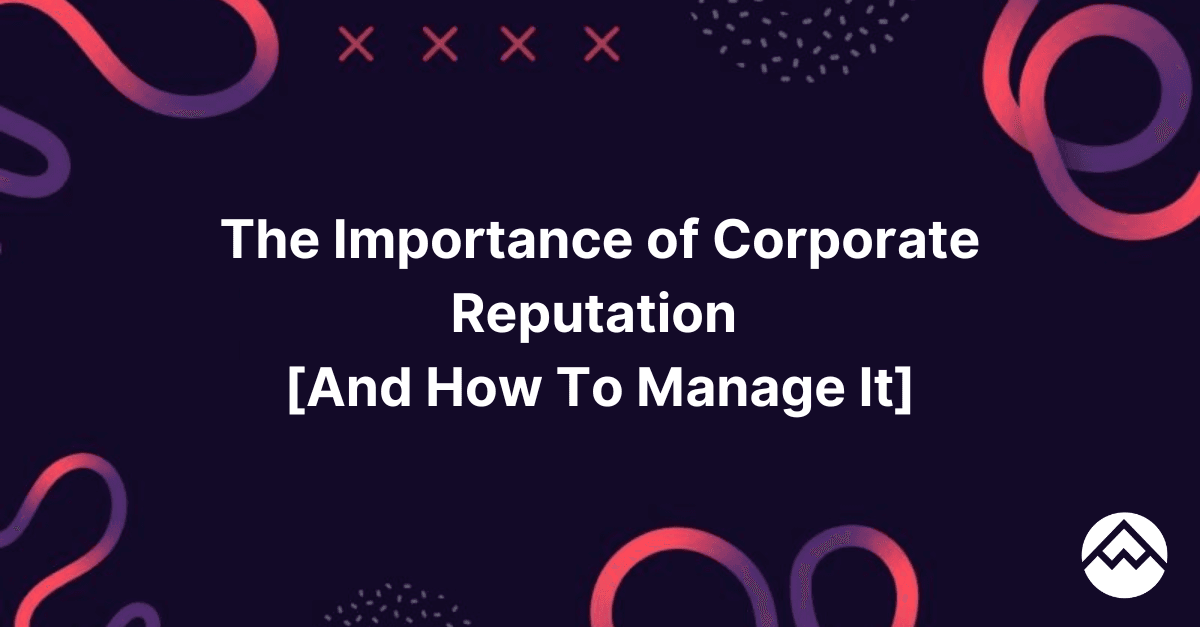
The Importance of Corporate Reputation [And How To Manage It]
Corporate reputation plays a critical role in shaping the financial success and staying power of any brand.
The concept of corporate reputation is not necessarily new. Brands have long sought to maintain a positive image in the eyes of customers, shareholders, and potential employees.
However, a variety of recent trends have increased the importance of corporate reputation. As a society, we’re constantly online; an offhand comment can become a viral scandal in a matter of minutes. Generative AI technology has made it easier than ever to produce and proliferate misinformation and disinformation.
In many ways, an organization’s reputation is more fragile than ever.
So what can be done? How can company leadership, communications teams, and security departments safeguard their company’s corporate reputation in such a chaotic digital environment?
PeakMetrics, the leading narrative intelligence company, works with global brands and governments to help them detect, decipher, and defend against online threats. We’ve helped our clients navigate the challenges of reputation management — and learned plenty of best practices along the way.
Let’s explore the importance of corporate reputation and introduce narrative intelligence, a foundational component of any reputation management strategy:
What is corporate reputation?
Corporate reputation refers to the collective perception of a company by its stakeholders, including customers, employees, investors, and the general public. A company’s reputation is a valuable, largely intangible asset that impacts various aspects of a business: customer loyalty, employee morale, market positioning, and financial performance.
Why is corporate reputation important?
Corporate reputation is important because it sets the foundation for each interaction between your brand and the outside world. Your brand reputation affects everything from talent acquisition to cybersecurity.
Combatting misinformation and disinformation.
Sometimes, brands are responsible for damaging narratives. An offhand comment, quote out of context, or misguided advertisement can set off a swirl of online fury. However, brands are increasingly facing threats from mis- and disinformation on social media. A misleading or untrue narrative can change how customers and other stakeholders perceive your brand.
- Misinformation costs organizations $78 billion annually.
- In the News: McDonald’s and Starbucks reported meaningful hits to their bottom lines as customers boycotted the companies for their perceived support of Israel.
Driving sustained financial success
A company that upholds a favorable and authentic reputation will typically foster a loyal customer base. Repeat customers can further amplify and uplift your brand perception. A strong reputation can help companies weather difficult economic conditions.
- Reputation accounts for 63% of a company’s market value.
- In the News: Several fashion brands, including Brandy Melville and Abercrombie & Fitch, are facing increased online scrutiny and boycotting after the release of an HBO documentary investigating the fast-fashion industry.
Attracting and retaining talent
The right people are crucial ingredients for any organization hoping to grow its market footprint. Organizations with excellent reputations will be better positioned to retain their star employees while enticing new ones to join the brand.
- 75% of job seekers will investigate a company’s reputation before applying for a job.
- In the News: Citi is facing pressure from climate activists, who attempted to block employees from entering the company’s offices on Wall Street.
How can you build a corporate reputation management strategy?
Reputation management is the practice of monitoring and shaping public perception around an organization’s brand.
Building an effective online reputation management strategy is crucial to maintaining your brand’s image. Here are a few tips:
- Share the responsibility of corporate reputation management between various teams: comms, PR, social media, analytics, data science, and security
- Emphasize proactive measures, rather than reactive and crisis-response approaches
- Consider the larger industry and media landscape beyond your brand
- Find the best tools and technology to support your efforts
Leading organizations will carefully shape the narratives around their organization to help enhance their corporate reputation.
How does narrative intelligence help you manage your corporate reputation?
Narrative intelligence refers to a strategic solution that brands leverage to detect, decipher, and defend their reputation from online narrative threats. Organizations use narrative intelligence to analyze how narratives form and spread across the internet, gauge the severity of threats, shape effective response plans, and swiftly make informed decisions.
The Peakmetrics narrative intelligence framework includes three main stages:
- Detecting emerging threats using narrative machine learning and the most comprehensive database of media sources and social media platforms
- Deciphering the significance of these threats with AI-driven threat scores and key integrations with industry partners
- Defending your brand by generating actionable insights and in-depth intelligence reports to guide response planning
Companies that embrace this active, data-driven approach will be more likely to neutralize emerging threats before they lead to a brand crisis.
Safeguard your corporate reputation with PeakMetrics
Corporate reputation is one of the most valuable assets a company has at its disposal.
Leading brands understand how their reputation affects their financial performance, public image, and growth potential. That’s why they trust PeakMetrics, the leading narrative intelligence platform.
Request a demo to learn how our technology can empower your reputation management strategy.
Request a free report
Uncover emerging narratives around your brand, industry, and competition.
Sign up for our newsletter
Get the latest updates and publishings from the PeakMetrics investigations team.